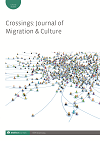-
oa Producing locality at night: From Lagos hometown meetings to Galway’s G Afro Vibez
- Source: Crossings: Journal of Migration & Culture, Volume 13, Issue Night Stories: Urban Narratives of Migrant Lives in Europe, Apr 2022, p. 11 - 26
-
- 01 Apr 2022
Abstract
This article charts the life experiences of Mitchell Okeke, a party organizer who runs the monthly night-time event ‘G Afro Vibez’ in the city of Galway, Ireland. Throughout, Okeke explores a range of diverse experiences gathering for music events and parties across his life as he moves between Lagos, New York and Galway. In doing so, Okeke shows how moments of gathering around music in migratory contexts were ‘watering his roots’, building the foundations for the development of ‘G Afro Vibez’, a large-scale nocturnal event designed for Galway’s youth, inclusive of Black-Irish and Afrodiasporic communities. By exploring the development of G Afro Vibez event, this article further details Black-Irish youth’s experiences of discrimination and exclusion in Galway’s nightclub scenes.
Funding
- Humanities in the European Research Area, NITE project (Award HERA 2.060)



